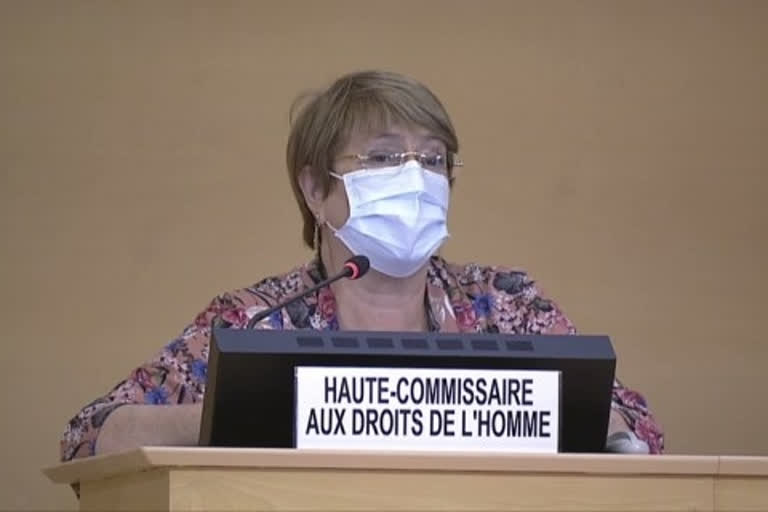United Nations: The UN High Commissioner for Human Rights Michelle Bachelet has urged legislators in the United Kingdom to heed warnings that the proposed new Overseas Operations (Service Personnel and Veterans) Bill, in its current form, risks undermining key human rights obligations that the UK has committed itself to respect.
She expressed concerns that, unless suitably amended, the Bill could lead to shielding military personnel operating abroad from due accountability for acts of torture or other serious international crimes.
The Bill is now reaching its final stages in the legislative process, and will shortly be debated again by the House of Lords, the UK’s upper chamber, where amendments may still be made.
The purpose of the Bill is stated as being “to provide greater certainty for Service personnel and veterans about claims and potential prosecution for historical events that occurred in the complex environment of armed conflict overseas.” It seeks to achieve this, in particular, by introducing new preconditions for the prosecution of alleged offences covered by the Bill, she added.
Read: Iran warns sabotage affects Vienna talks over nuclear deal
In its present form, the proposed legislation raises substantial questions about the UK’s future compliance with its international obligations, particularly under the Convention against Torture and Other Cruel, Inhuman or Degrading Treatment or Punishment (CAT), as well as the 1949 Geneva Conventions. These include obligations to prevent, investigate and prosecute acts such as torture and unlawful killing, and make no distinction as to when the offences were committed.
“As currently drafted, the Bill would make it substantially less likely that UK service members on overseas operations would be held accountable for serious human rights violations amounting to international crimes,” Bachelet said in a statement issued by the UNHR office of the High Commissioner.
Bachelet urged that all international crimes which the United Kingdom is under an international legal obligation to investigate and prosecute be excluded from the proposed restrictions. She welcomed the fact that Schedule 1 of the Bill already excludes numerous sexual offences, including rape, from the scope of the Bill. She urged that all other crimes of equal seriousness and concern be treated in the same way.
“The prohibition of torture in international law is both clear and absolute,” Bachelet said. “Article 2 of the Convention against Torture is unequivocal, stating that ‘No exceptional circumstances whatsoever, whether a state of war or a threat of war, internal political instability or any other public emergency, may be invoked as a justification of torture. "The obligations in the Convention to investigate and prosecute such allegations recognize none of the new distinctions that the Bill would now bring into law.
“The Overseas Operations Bill risks undermining these clear obligations in several ways,” Bachelet said in the statement.
These include the proposed introduction of a formal presumption against prosecution of relevant crimes committed more than five years earlier when committed by service members overseas. It also requires prosecutors in such cases to ‘give particular weight’ to certain matters, notably the adverse effect on service members of conditions to which they were exposed during deployment.
Read: India assures commitment to engage on measures for democratic transition in Myanmar
This could lead to serious crimes not being adequately addressed – potentially in violation of the UK’s obligations, including under the Convention against Torture and other international treaties.
Another potential obstacle to full accountability would be the new requirement of the consent of the Attorney General or, where applicable, the Advocate General of Northern Ireland before prosecution can proceed for relevant offences committed more than five years earlier.
The High Commissioner also expressed concern about other provisions in the Bill, including one that would limit the ability of courts to consider certain civil claims in connection to overseas operations, after more than six years have passed. She pointed out that this may adversely affect victims’ rights to remedy, redress and access to justice recognized under international law.
Another concern is that the current text of the Bill places a duty on the Government to consider derogation from its international human rights obligations set out in the European Convention on Human Rights, about such overseas operations.
“I appreciate the Government’s engagement with my Office on these issues. I also note that similar concerns have been raised by numerous politicians, NGOs, lawyers and former senior British military officers, as well as by the UN Committee against Torture and a group of UN Special Rapporteurs, including the Special Rapporteur on Torture,” Bachelet said.
“I urge UK legislators in both Houses of Parliament, and the Government, to take these concerns fully into account when reviewing the Bill, and to ensure that the law of the United Kingdom remains entirely unambiguous about accountability for international crimes perpetrated by individuals, no matter when, where or by whom they are committed,” she reiterated.
“The ability of the UK’s courts to resolve the most serious allegations against military personnel, with the independence and fairness for which they are known around the world, should be maintained and strengthened, rather than be cut back on such problematic grounds,” she added.
Read:Moscow wants no war with Ukraine but cares for Russian-speaking residents



